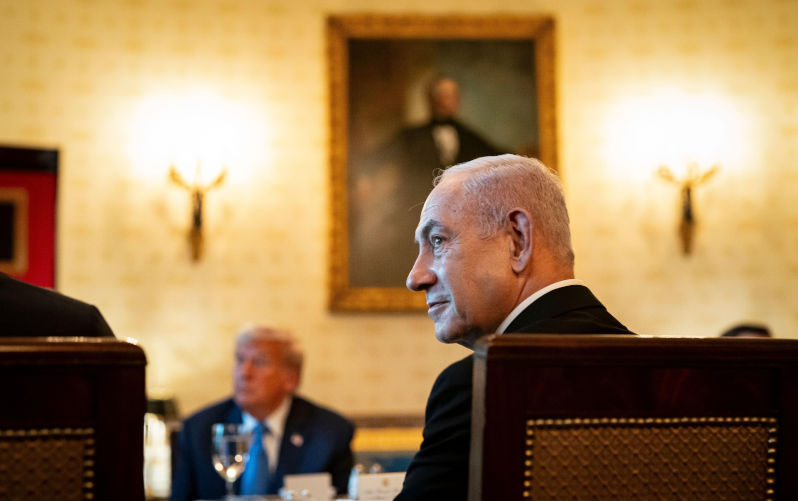When war criminals are nominated for the Nobel Peace Prize, what does 'peace' even mean?
August 11, 2025
In 1939, a member of the Swedish parliament nominated Adolf Hitler for the Nobel Peace Prize.
The nomination, though reportedly satirical, caused an international uproar and was quickly withdrawn. Around the same period, Benito Mussolini received a serious nomination, and in 1945, a group of supporters proposed Joseph Stalin for the same honour – twice. Each of these men was responsible for the deaths of millions. Yet their names were, at one point, placed alongside that of Alfred Nobel, the Swedish inventor who famously dedicated his fortune to rewarding those who “shall have done the most or the best work for fraternity between nations”.
The prize, founded in 1901, has often been treated as the moral compass of international politics. But over its century-long history, the Nobel Peace Prize has been no stranger to controversy. Today, as President Donald Trump is nominated for the same award — reportedly by Israeli Prime Minister Benjamin Netanyahu, whose government stands accused of committing genocide in Gaza — one must ask: how did we get here? And what does it say about the state of global justice and moral clarity?
From dictators to ‘peacekeepers’
It is tempting to dismiss the nominations of men like Hitler or Stalin as aberrations. But they are part of a broader pattern: the persistent entanglement of power, violence, and moral recognition.
Henry Kissinger, former US Secretary of State, received the Peace Prize in 1973 for negotiating a ceasefire in Vietnam. Yet Kissinger’s role in prolonging that war, his support for the coup in Chile, and backing of authoritarian regimes from Indonesia to Argentina has led many to consider the award a dark irony. As the late comedian Tom Lehrer quipped, “Political satire became obsolete when Henry Kissinger was awarded the Nobel Peace Prize.”
Former Israeli Prime Minister Menachem Begin shared the prize with Egyptian President Anwar Sadat in 1978, following the Camp David Accords. Begin had previously been the leader of the Irgun, a Zionist paramilitary group responsible for acts of violence widely considered terrorism, including the bombing of the King David Hotel in 1946. Likewise, Yasser Arafat, leader of the Palestine Liberation Organisation, received the award in 1994 alongside Yitzhak Rabin and Shimon Peres. While the Oslo Accords were considered a diplomatic breakthrough, the bloodshed before and after the agreement has led many to question whether such awards are premature, or even performative.
Trump, Netanyahu and Gaza
The current nomination of Trump comes in the context of his role in brokering the “Abraham Accords” –normalisation agreements between Israel and several Arab states. While marketed as peace deals, these accords bypassed the central issue of the Israeli-Palestinian conflict, effectively sidelining the aspirations of millions of Palestinians.
More striking is the fact that Trump is being nominated by Netanyahu – under whose leadership Israel has launched one of the most devastating assaults on Gaza in recent history. Tens of thousands of Palestinians, many of them women and children, have been killed or displaced, and much of Gaza’s infrastructure has been destroyed. The International Court of Justice is examining charges of genocide. For Netanyahu, accused by international human rights groups of overseeing collective punishment and ethnic cleansing, to be able to nominate someone for a peace prize borders on the surreal.
Yet this is not a deviation from the norm – it is a symptom of a deeper malaise in the global system of moral judgment. When war criminals nominate populist leaders for peace awards, we are no longer witnessing mere irony. We are confronting a profound crisis in how peace, justice and legitimacy are defined.
Peace as power, not principle?
Part of the problem lies in the very nature of the Nobel Peace Prize. It is not awarded by an international legal body or peace tribunal, but by a five-member Norwegian committee selected by that country’s parliament. This means the prize is inherently political, subject to the ideological leanings and foreign policy interests of its time.
Moreover, in an age of media spectacle and polarised narratives, peace has become less about lasting justice and more about short-term deals, photo opportunities and strategic alliances. The Nobel Prize, once reserved for those who championed disarmament or reconciliation, is now often handed to leaders for signing temporary truces or agreements that serve geopolitical interests. In the case of Barack Obama, the rationale remains especially perplexing. As Justin Salhani wrote in ThinkProgress (18 September 2015): “The prize was thought to be pre-emptive and encouraging for a leader who had ambitious global plans for scaling down a militaristic American foreign policy.” In other words, it was awarded before Obama had done anything to merit such recognition.
As the world watches the unfolding catastrophe in Gaza, and as the architects or apologists of this violence seek international acclaim, it is not surprising that many people feel disillusioned. The legitimacy of awards, institutions, and even international law itself is being eroded – because the gap between principle and practice has become impossible to ignore.
Toward a moral reckoning
What does it mean when figures responsible for war, occupation, and oppression are celebrated as peacemakers? At the very least, it reveals a dangerous confusion in our collective moral compass. At worst, it signals a collapse of the values the international community claims to uphold.
Perhaps the question is no longer why such people are nominated, but why we still expect moral clarity from institutions embedded in power structures. The solution may not lie in better prize selections, but in demanding more accountability – from states, from leaders, and from the systems that reward them.
If peace is defined by those with the loudest voices and largest armies, justice will remain out of reach for those who need it most.
The views expressed in this article may or may not reflect those of Pearls and Irritations.

